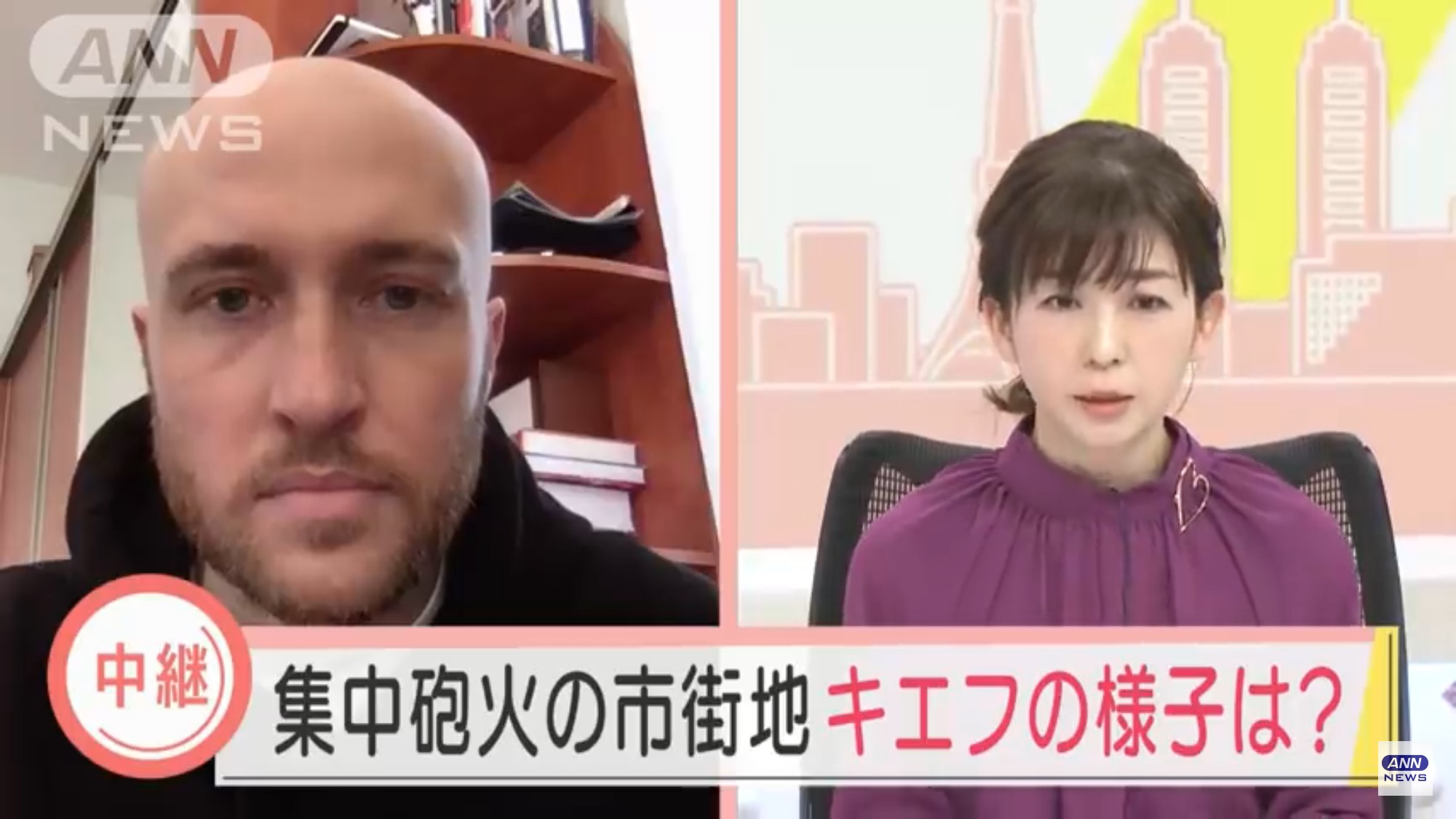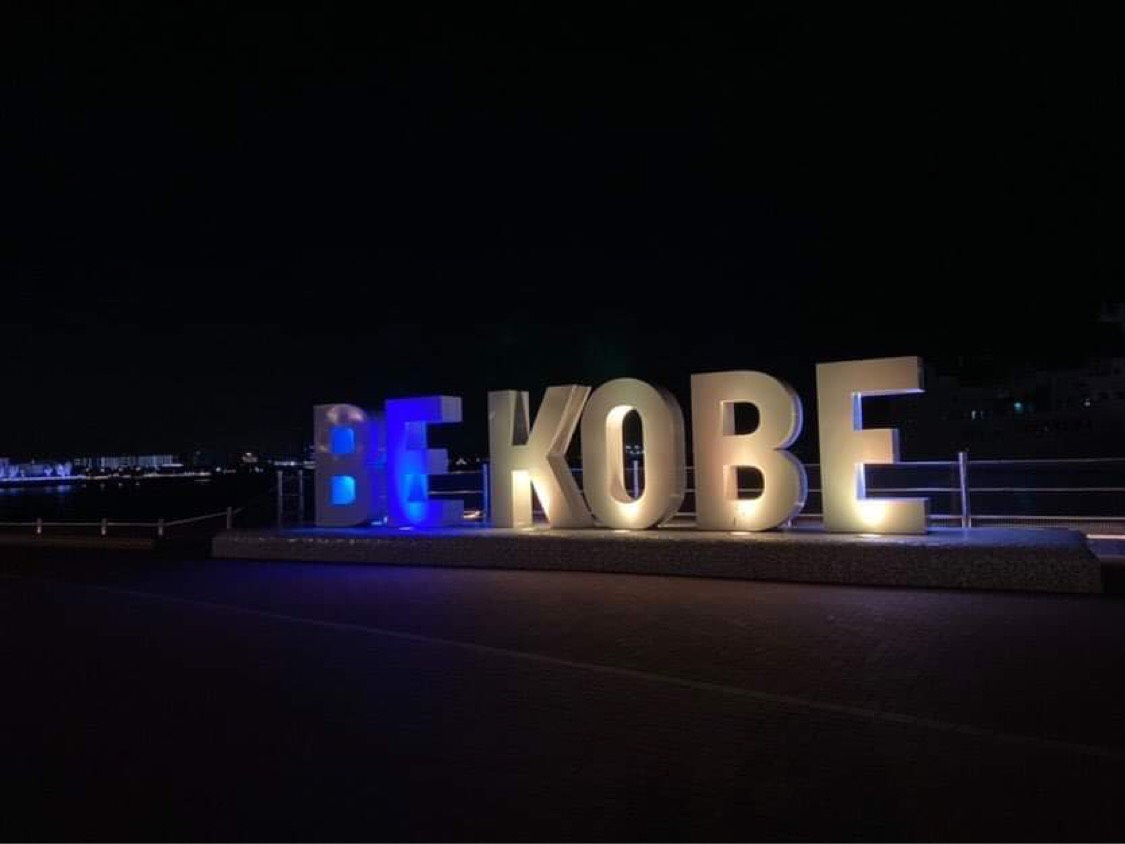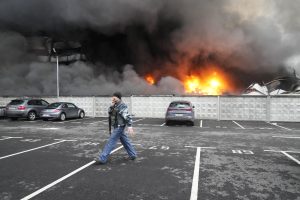As the Russian war against Ukraine drives an escalating humanitarian catastrophe, which the U.N. says could soon swell to 4 million refugees, one Ukrainian family with deep ties to Japan is staying put. Two Ukrainian-Japanese brothers, Bogdan Parkhomenko and Stephan Seki, adjust a laptop and check the sound before the older brother, Bogdan, smiles, waves, and greets his audience with konbanwa (“good evening” in Japanese).
The brothers, along with their mother, Stephan’s girlfriend, and Bogdan’s beloved Yorkshire terrier Yolka, have been sheltering inside their Kyiv home as the war grinds on around them.
Before Russia’s February offensive, Bogdan, 35, and his younger brother Stephan, 22, were operating an international trading company, importing health and beauty products from Japan. Now, with ordinary life snuffed out by war, Bogdan has taken on the role of speaking to Japanese media and his followers on Twitter, YouTube, and Instagram about life under siege in Kyiv.

Bogdan appearing on Japanese television, telling Japanese audiences about what’s happening in Ukraine.
In a Zoom call eight days after Russia violently expanded its war in Ukraine, Bogdan said he’s lucky to be with his family, sheltering at home, and to still have food, water, and the ability to communicate with the outside world. Having internet access and social media allows him to speak to people in Japan, describe what’s happening in Kyiv, and encourage them to get involved.
Bogdan, who in better times exercises by rock climbing, now spends his days and nights sitting for interviews and helping coordinate grassroots relief efforts, using donations to buy and distribute food and essentials, especially to the elderly. The Russian war, he reminds viewers, didn’t start two weeks ago, but has been ongoing in eastern Ukraine since 2014.
Although Japan is more than 8,000 kilometers from Ukraine, it’s just 43 km from northernmost Hokkaido to Russia’s Sakhalin Island, part of which Japan administered until the end of World War II. Russia and Japan never signed a peace treaty after the war and continue to be divided by an ongoing territorial dispute over the Russian-controlled southern Kuril Islands, northeast of Hokkaido, which Japan calls the Northern Territories.
Besides territorial disputes with Russia, Bogdan says Ukraine and Japan are linked by their shared experience with nuclear disasters — Chernobyl in 1986 and Fukushima in 2011. Bogdan was born just two months after the Chernobyl accident in the central Ukrainian city of Dnipro where his mother moved to get away from the radiation in the north.
Seeking a safer environment for her child, she later moved to Japan where Bogdan grew up and, in 1999, his brother Stephan was born. They’ve spent most of this century back in Ukraine, but in 2017 Bogdan returned to Nagoya to work in a Japanese company for two years.
Growing up in Japan’s Kansai region has had a strong influence on Bogdan’s way of thinking and communicating, which, he says, resonates with Japanese not only because of his fluid language skills and ability to understand Japanese sensibilities, but because he has a calm, steady demeanor and strikes a positive outlook, even as air raid sirens wail in the background.
When discussing the war, Bogdan doesn’t sound angry or aggressive. He isn’t hostile and he doesn’t apportion blame. He explains the situation, clearly and with context. His message has reached former Japanese politicians, well-known public figures, and ordinary Japanese who express a newfound interest in the faraway nation most knew little about until the war broke out. Bogdan hopes more Japanese companies will suspend their business dealings with Russia to add pressure. He implores them, “Please stop export of all products to Russia because we want to stop [the] war.”
As more Japanese follow Bogdan’s live stream and media reports, their concern is translating into support — not just moral, but financial. Japanese are sending donations directly to humanitarian organizations and to Bogdan and his brother, who is helping coordinate on-the-ground relief for people who need everything from staple foods, water, and hygiene products to pet food and other supplies.

A sign in Kobe, lit up with the colors of the Ukrainian flag.
Bogdan, who was living in Kobe during the 1995 Great Hanshin Earthquake, says the similarities and uncertainty of that disaster, and the unfolding war in Ukraine now are striking. “We don’t know what will happen in the next few minutes, hours. We don’t know which situation is better — staying here or moving.” Evacuating to western Ukraine would require gasoline he doesn’t have and a precarious journey along roads that may not be passable. For now, he says, staying in central Kyiv may be their safest option.
The war, Bogdan says, has revealed the Ukrainian character to the world. “Ukrainians show how we are strong spiritually. Not physically. This is a battle of physical power and mental power. We show our mental power and Russia shows their physical power.”
For a man whose life has been punctuated by traumatic events — a nuclear meltdown, a massive earthquake, revolutions, and now war — Bogdan remains remarkably upbeat. “I’m still smiling. I’m still positive. I don’t criticize. I just show what we have to do.”
He speaks with admiration for his fellow citizens, saying, “Ukrainian people are very spiritual people. They communicate and talk with [their] heart.” Sharing this message with Japan and the outside world has become his mission. “I’ve been living for 35 years to be here to connect Japan and Ukraine to change the world.”
He believes this conflict, which he calls a “controlled war,” is a sign that it’s time to change the whole world and upend old structures. “We have to make a great reset of all rules, all situations, all powers,” Bogdan says.
“We are really a material world. We’re like ‘money, money, money, money,’ but we have to change to spiritual growth, to understand love, peace, calm, relax, freedom.”
Bogdan believes that he and people like him — dual nationals and others who possess not just multilingual prowess, but who have a deep understanding of multiple, even conflicting cultures or systems — can effect change from the inside. Stepping back to take a wider view of the war, Bogdan says Putin has forced Ukraine to a low point from which it will ultimately rise.
For Bogdan, with his understanding of Japanese, Ukrainian, and Russian culture, language, and history, he feels a need to introduce a different perspective to the geopolitical conversation happening in Japan now.
He hopes Japan-Ukraine relations will only deepen and continue to thrive long after the current conflict. Ukraine will need international partners and friends when it’s time to recover and rebuild from the brutal, merciless war raging today.
































